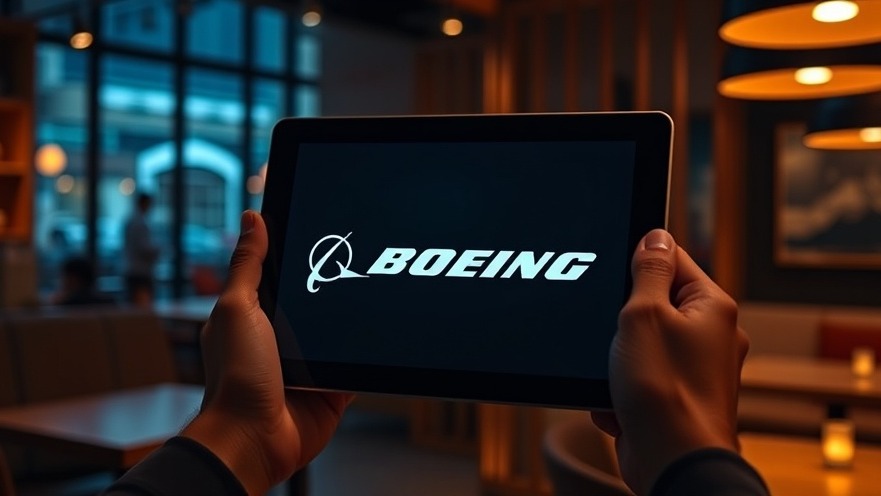
Boeing: A Struggling Giant in Need of Oversight
Amidst a tumultuous period marked by multiple safety incidents, Boeing's path to regain public trust seems fraught with challenges. U.S. Transportation Secretary Sean Duffy's statements underscore the critical need for oversight after Boeing's credibility took a serious hit following the tragic occurrences surrounding its 737 MAX series. A mid-air emergency in January 2024 served as a harsh reminder of the repercussions of negligence, leading Duffy to declare that Boeing must change its ways or face stricter regulations.
Contextualizing the Crisis
Boeing's recent troubles trace back to two catastrophic crashes in 2018 and 2019, which resulted in the deaths of 346 individuals. This dark chapter of Boeing's history not only affected its reputation but also highlighted systemic issues within its safety protocols and manufacturing processes. Duffy's comments that “when you breach the trust of the American people...we’re going to put the screws to you” resonate deeply in the context of public safety and corporate accountability.
The Company’s Response and Future Outlook
In response to these incidents, Boeing has been proactive in initiating sweeping changes aimed at rebuilding trust. As reported by NPR, the company presented a comprehensive plan mandated by the Federal Aviation Administration (FAA) to correct its quality control issues. The FAA recently conducted a review following a troubling incident involving an Alaskan Airlines flight where key safety components were missing. The plan entails stringent oversight of manufacturing processes, stringent safety measures, and thorough employee training to prevent future oversights.
The Role of Leadership and Culture
Central to Boeing’s recovery efforts is its leadership's commitment to fostering a culture of safety. Boeing CEO Dave Calhoun finds himself in a challenging position; while he garners praise for navigating the company through the aftermath of the pandemic, his ultimate test will be restoring safety standards. As highlighted in insights from Yale, embedding safety deeply within the organization requires not just reactive measures, but a complete overhaul of governance and internal processes. Multiple reports of quality control failures suggest that significant gaps exist, and a stronger proactive approach is essential.
Regulatory Oversight: A Double-edged Sword?
Regulatory scrutiny is both a boon and a potential hindrance for Boeing. While increased oversight from the FAA aims to ensure compliance and bolster safety, it may simultaneously stifle production growth. Duffy's comments that Boeing is far from lifting a stricter production cap indicate that the road to recovery is long and fraught with regulatory hurdles. According to reports, Boeing is now operating well below its production capacity of 38 planes a month and must demonstrate unwavering commitment to quality before any lifting of caps.
Improving Supplier Relationships
The relationship between Boeing and its suppliers has also come under fire, particularly with Spirit AeroSystems, the company responsible for manufacturing the fuselage of the 737. Reports have emerged detailing numerous quality control failures within this supply chain, raising concerns about Boeing's operational resilience. Addressing these supplier issues is critical, as the quality of components directly impacts the final product's safety. Efforts must be united to clean up the supply chain and ensure accountability across all levels.
The Impact of Public Perception
Public sentiment towards Boeing has dramatically shifted in the wake of these recurring incidents. While Duffy noted that there is still “tough love” needed, there are indicators that the public is cautiously optimistic about Boeing's recovery efforts. However, as noted in the discussions surrounding Boeing, the broader issue of public trust hinges on consistent safety performance. Experts argue that transparency and a proactive approach to communicating safety initiatives could soften the damage and rebuild public confidence.
Conclusion: A Call for Continued Vigilance
Boeing stands at a crossroads where its future hinges on accountability, safety, and trust. As both regulators and the public remain vigilant, Boeing's commitment to reform will determine if it can move past its troubled past and emerge as a leader in safer aviation manufacturing. The transformations underway are not just operational changes; they are essential steps toward changing public perception forever. Residents and stakeholders interested in the aerospace industry should keep a close eye on Boeing’s path forward, as it reflects larger trends in corporate responsibility and safety culture.
 Add Row
Add Row  Add
Add 




Write A Comment